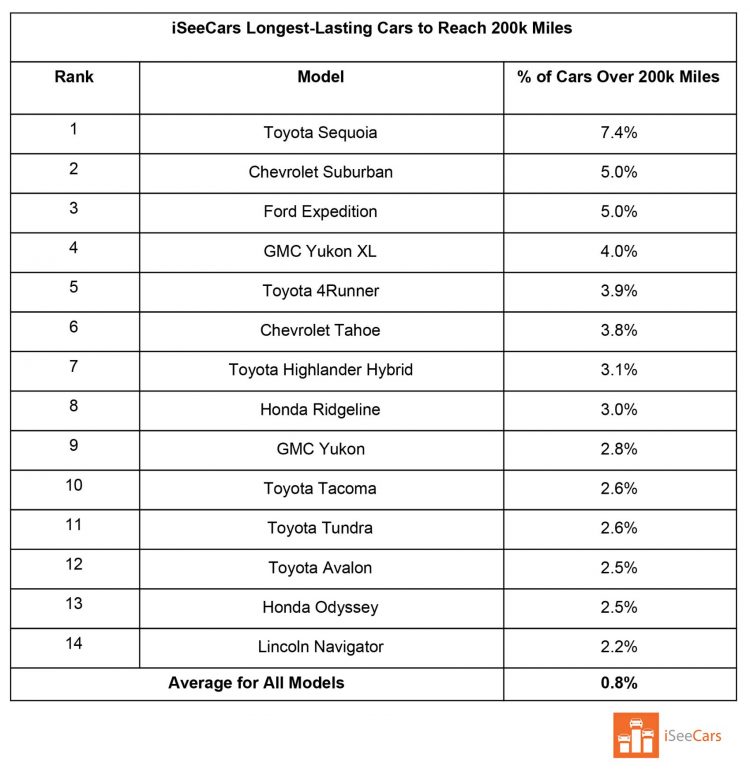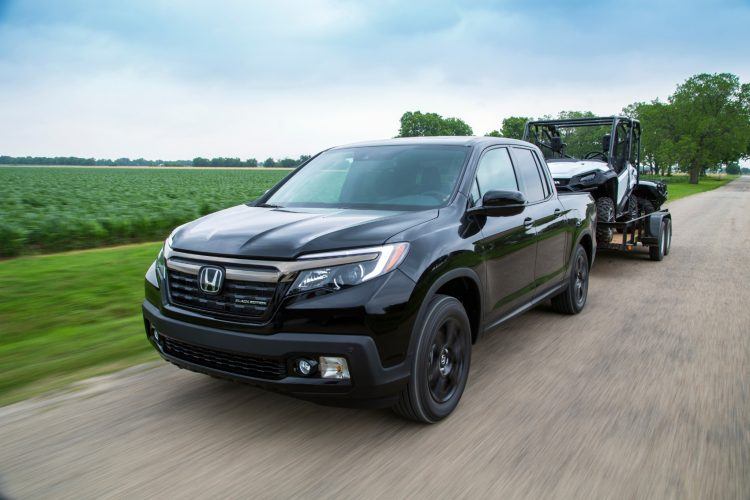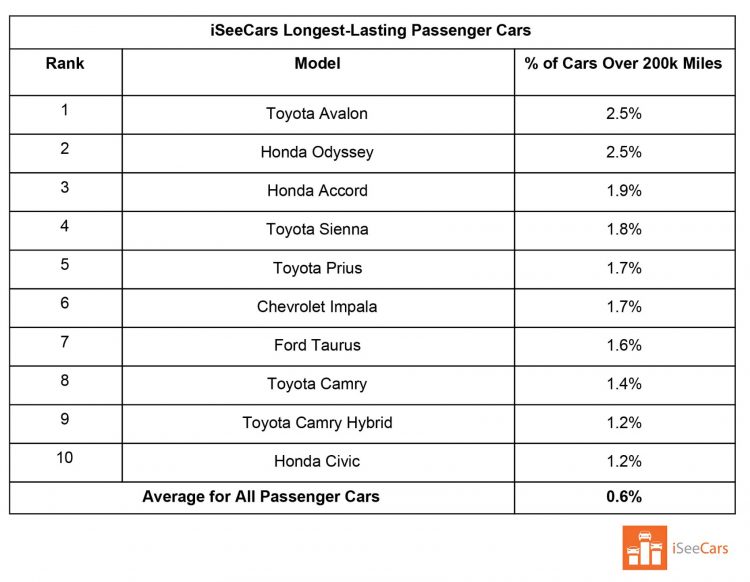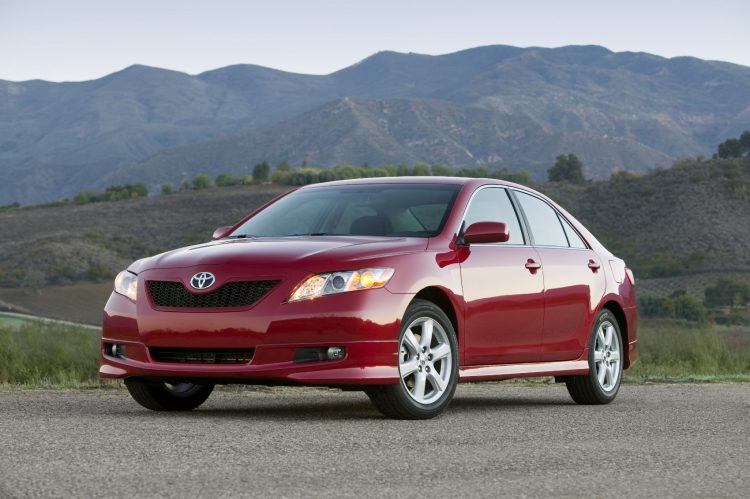A comprehensive study from iSeeCars has identified the vehicles most likely to reach 200,000-miles. The study is an eye-opener for potential car buyers. If you’re in the market for something new, this study reveals the longest-lasting vehicles on the road today. It not only covers SUVs, sedans, and pickups but also offers insight into luxury and sports cars. The study ultimately shows that while modern vehicles benefit from advances in technology and manufacturing, some are simply better than others.
SUVs, for example, are among the most reliable vehicles today.
“A few patterns stood out when we completed this study,” explained Julie Blackley, iSeeCars Communications Manager. “The first is the dominance of full-size SUVs with body-on-frame or truck-based platforms. Also, American vehicles have a strong showing on the overall list, with six full-size SUVs earning the distinction of the longest-lasting vehicles.”
Combing Through The Data
The study involved over 13.8 million cars sold in 2019. Using that data, iSeeCars found 14 vehicles most likely to eclipse the 200,000-mile mark. The average nameplate has .8 percent of its vehicles achieving 200,00 miles or more, but car shoppers can increase their odds by considering one of the 14 entries on the list.
“This is a very important topic, because regardless of if you plan on keeping your car for 200,000 miles, most car shoppers want a reliable and durable vehicle,” Blackley said. “It’s important for consumers to have unbiased information to help them make an informed purchasing decision, which is why we analyzed over 13 million listings to develop this study.”
Big SUVs Stand Out
Earning the top spot is the Toyota Sequoia full-size SUV. The study shows 7.4 percent of Sequoias have logged 200,000 or more miles on the odometer. Tied in second and third place respectively are the Chevy Suburban and Ford Expedition. Next is the GMC Yukon XL (four percent), Toyota 4Runner (3.9 percent), Chevy Tahoe (3.8 percent), and Toyota Highlander Hybrid (3.1 percent).
Further down the list, we see the Honda Ridgeline (three percent), GMC Yukon (2.8 percent), Toyota Tacoma (2.6 percent), and Tundra (2.6 percent). Also included are the Toyota Avalon, Honda Odyssey, and Lincoln Navigator.

Longest-Lasting Vehicles: Pickup Trucks
According to the study, the top five trucks are the Honda Ridgeline, Toyota Tacoma and Tundra, Chevy Silverado 1500, and Ford F-150. The Nissan Titan, GMC Sierra 1500, Ram 1500, Chevy Colorado, and Nissan Frontier each bring up the rear. The Silverado ranks higher than the Sierra, something we find odd since both come from the same Fort Wayne, Indiana assembly line. Suffice to say, both trucks are mechanically identical, albeit targeted at different buyers.
“We were surprised by this too,” Blackley said. “The Chevrolet Silverado is more of a working truck, while the GMC Sierra markets itself as more luxurious. As such, the Silverado may log more miles since it’s more likely to be used for work purposes.”
A Steel Horse
On this particular list of tough workhorses, the Honda Ridgeline sticks out like a sore thumb. It is the only one with a unibody (unit-body in Honda speak), or a car-like platform. And yet, it manages to be the study’s top truck, besting its more rugged body-on-frame competitors. “While we weren’t surprised to see this vehicle on the list as Honda has a strong reputation for reliability, we found it interesting that the unibody Ridgeline was the longest-lasting pickup,” Blackley said.
The Honda Ridgeline utilizes six different grades of steel, including high-strength and ultra-high-strength steel in the unit-body. An aluminum hood and front bumper-reinforcement beam combines with a cast-magnesium steering hanger beam. These materials and their placement were determined by strength, safety, and overall performance, according to Honda. Versus the prior generation, the new Ridgeline has 28 percent greater torsional rigidity, meaning it’s more rugged than it looks.
“The success of the Ridgeline has paved the way for other automakers to develop similar pickup trucks,” Blackley added. “These vehicles fill a void by attracting a consumer who wants the function of a pickup truck with the comfortable handling of a crossover.”

Truth In Toyota’s Pudding
Six of the 14 vehicles in this longevity study carry a Toyota badge. The results mirror a similar study conducted by iSeeCars that focused on ownership; specifically cars that original owners were most likely to keep for 15 years or more. After analyzing over 750,000 vehicles sold in 2018, iSeeCars found that Toyota owners went the distance in terms of ownership. Although revealing, these findings are not exclusive to the research conducted by iSeeCars either. Toyota vehicles remain the creme of the crop in other similar studies.
“Toyota performs well in most of our studies related to longevity and reliability,” Blackley said. “These rankings are consistent with other vehicle reliability rankings from other companies like J.D. Power and Consumer Reports.”
“Honestly, I think this is about resale value as much as it is anything else; reliable cars have a higher resale value with all things being equal,” added Tom Blackman, Parts Director at Olathe Toyota Parts Center in Olathe, Kansas. “I also think a lot of older Toyotas are on the road because people have more invested in them.”
Toyota was named for a third year as the Best Brand in Kelley Blue Book’s Best Resale Value Awards. Kelley Blue Book said of the award that Toyota has a reputation for building high-quality vehicles. On KBB’s list, the Tacoma received top honors for resale.
“You don’t scrap an old Tacoma that needs work. The same can’t be said for an old Ford Ranger or Chevy Colorado,” Blackman explained. “If you buy an old Ford Taurus for $1,200, and it needs a $1,000 repair, you probably just scrap the car; but if you buy an old Toyota Camry for $3,500 and it needs a $1,000 repair, you fix it.”
Engineering Innovations & Customer Commitments
Perhaps one reason why Toyota tops this study from iSeeCars (and other similar ones) is the company’s commitment to quality and innovation. In 2017, for example, Toyota opened their $80 million, 235,000 square-foot Production Engineering and Manufacturing Center (PEMC) in Georgetown, Kentucky.
The facility serves as a home base for more than 600 Toyota production engineers with a 50/50 split between desk and collaboration space. All desks are sit-to-stand and engineers regularly meet with other teams. The goal? All 600 boffins are there to brainstorm and solve problems before a potential issue becomes a huge headache to the consumer.
“Our production engineers are at the top of their game and help shape the future of Toyota,” said Jim Lentz, Chief Executive Officer of Toyota Motor North America. “They push the limits every day on what’s possible in manufacturing to produce ever-better vehicles.”
Blackman believes Toyota “sweats the little stuff” and will always go the extra mile.
“I’ve worked in this business for 30 years, and Toyota is the only automaker I know of that sends engineers out into the field to ask questions,” he said. “If a Toyota vehicle or part has a problem, Toyota sends engineers out to see for themselves. They ask questions and listen to the response. Most of the other brands I’ve worked with are too cheap or too arrogant to send engineers out to look at something.”
“This not only speaks to the quality of Toyota vehicles, but also to the consumers who buy them,” Blackley added.

Longest-Lasting Vehicles: Sedans, Hybrids & Minivans
iSeeCars also examined passenger cars, green vehicles, and minivans, where Toyota again held most of the list. The Toyota Avalon is first, then the Honda Odyssey, Accord, Toyota Sienna, and Prius. Rounding out the top ten are the Chevy Impala, Ford Taurus, Toyota Camry and Hybrid, and the Honda Civic. The Toyota Highlander Hybrid, Lexus RX 450h, and Lincoln MKZ Hybrid also made the list of longest-lasting vehicles.
We’re not surprised to see the Impala and Taurus here. Both are common fleet/rental cars and are more likely to pile up the miles. With regard to everyday family vehicles, Honda takes the gold.
“The Honda Odyssey represents the vehicle segment most commonly associated with family hauling,” Blackley said. “If they do choose to keep a minivan for the long haul, it is most likely to be the Odyssey.”

Tips & Advice: Keep It Simple
There’s a general consensus that – compared to older ones – newer vehicles are less prone to breaking down. But whether old or new, every vehicle has the potential to reach 200,000 miles with proper care and diligent maintenance. While the iSeeCars study points overwhelmingly to Toyota, there are things you can do to keep your vehicle running like clockwork, regardless of make and model. Basic things like regular oil, fluid, and filter changes, and checking the tire pressures and tread depths will benefit your vehicle in the long haul.
“Regardless of whether or not they appeared on this list, every vehicle made today has the potential to reach 200,000 miles with the proper maintenance and care,” Blackley said. “Routine oil changes and following the manufacturer’s suggested maintenance schedule are behaviors that can help a car last longer.”
Tips & Advice: Seasonal Factors & The Power of DIY
Varying weather conditions also affect the longevity of your vehicle. As the seasons change, certain parts in your vehicle can wear faster than others. It’s important to be aware of these top seasonal car repairs to help you cope with the unexpected. The more you know about car maintenance, the more likely your car will stay running for 200,000 miles and beyond.
“My advice is always the same: do the scheduled maintenance, drive it like you want it to last forever, and do as much work as you can yourself,” Blackman said. “It can be a hassle to change your own oil or replace your spark plugs, but it helps you stay on top of things.”
“Don’t forget regular car washes either,” Blackley added.





